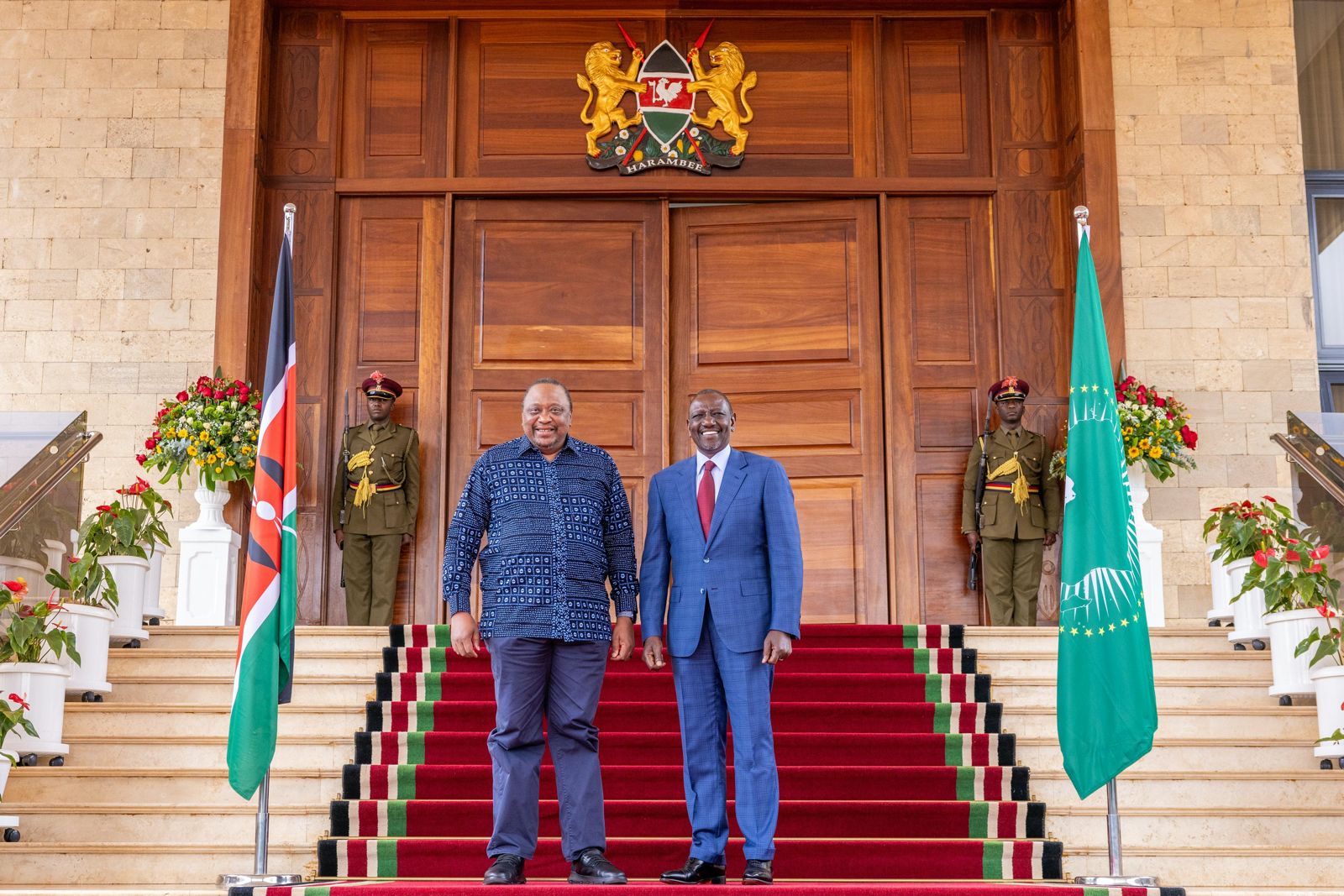
 Former President Uhuru Kenyatta and his successor William Ruto at State House, Nairobi on August 1, 2025. /PCS
Former President Uhuru Kenyatta and his successor William Ruto at State House, Nairobi on August 1, 2025. /PCSFormer President Uhuru Kenyatta and his successor William Ruto were on Friday publicly seen together for the first time since their December 9, 2024 meeting in Ichaweri, Gatundu, when Ruto paid his predecessor a courtesy call.
The two shared a platform at State House, Nairobi, during a joint East African Community (EAC) and Southern African Development Community (SADC) co-chairs meeting with the panel of facilitators overseeing the Democratic Republic of Congo (DRC) peace process.
Zimbabwe President Emerson Mnangagwa, who chairs SADC, also attended the closed-door meeting.
The sight of Uhuru and Ruto together comes against the backdrop of a politically strained but mutually respectful relationship.
While not sworn enemies, the two are certainly not close allies, following the fallout in the lead-up to the 2022 General Election.
Uhuru, then in power, endorsed Orange Democratic Movement (ODM) leader Raila Odinga as his preferred successor, a move that saw him openly campaign against Ruto—his deputy at the time.
Ruto went on to defeat Raila at the ballot and succeeded Uhuru as Kenya’s fifth President.
Uhuru now attends such forums in his capacity as the African Union-Kenya Peace Envoy and Facilitator of the EAC-Led Nairobi Peace Process.
When they last met in December, State House described their discussions as centred on national and regional interests.
“President Ruto took the opportunity to reiterate his appreciation and commendation of His Excellency President Kenyatta’s statesmanship in overseeing the peaceful transfer of power after the 2022 elections,” the statement read in part.
It further noted that President Ruto “thanked Uhuru for the goodwill the former President has continued to demonstrate toward his fellow leaders and his support for Kenya’s ongoing progress and development.”
A day after the Ichaweri meeting, while addressing a public rally in Wajir, President Ruto elaborated on the importance of unity and cooperation among the country’s top political figures.
“As leaders, we must continually build bridges instead of creating barriers at a time the country needs collective input to address its challenges,” he said.
Ruto cited the same reason for his decision to work with Raila and to maintain cordial ties with Uhuru, whom he appointed as peace envoy immediately after his swearing-in on 13 September 2022.
“That’s interesting when he didn’t support you to be President. Why do you think he should stay in that role?”
Ruto was questioned during a September 24, 2022 Al Jazeera interview about retaining Uhuru in the peace mediation role despite the 2022 political betrayal.
“I'm the President of Kenya, I'm the big brother now and it's in my place to work with him,” Ruto responded.
Ruto had already publicly affirmed this resolve during his inauguration at Kasarani Stadium.
“I have committed that the government of Kenya will support those initiatives that will be chaired by President Uhuru Kenyatta. I want to thank you Uhuru Kenyatta for agreeing to support us and to help me in those interventions.”
Speaking to Al Jazeera, Ruto doubled down on the maturity of the decision, saying: “I will not allow negative energy to be build around our country. It was a competition and President Kenyatta had a candidate, his candidate did not win, I beat his candidate. That's a democratic process.”
Ruto maintained that the election was now behind them and governing the nation was the bigger task at hand.
The imagery of their reunion after nearly eight months apart sends a clear political message: institutional stability takes precedence over personal rivalry, something Ruto has consistently been telling the political class critical of his March 7 MoU with Raila.
While Uhuru has remained largely silent on domestic politics since leaving office, his role in the DRC peace process gives him continued relevance in the regional arena.
His presence at State House plays into Ruto’s broader strategy of unifying former rivals in the interest of national interest and portrays him as a leader above grudges.
In a country where political wounds often fester long past elections, Friday’s image of former adversaries sharing a table and happily shaking hands sends a message that the business of state can, at times, override political bitterness.
However, it remains to be seen whether or not this is a rekindled bromace that will defy the test of time as the country gears up for yet another round of charged electioneering season with the 2027 polls barely two years away.












